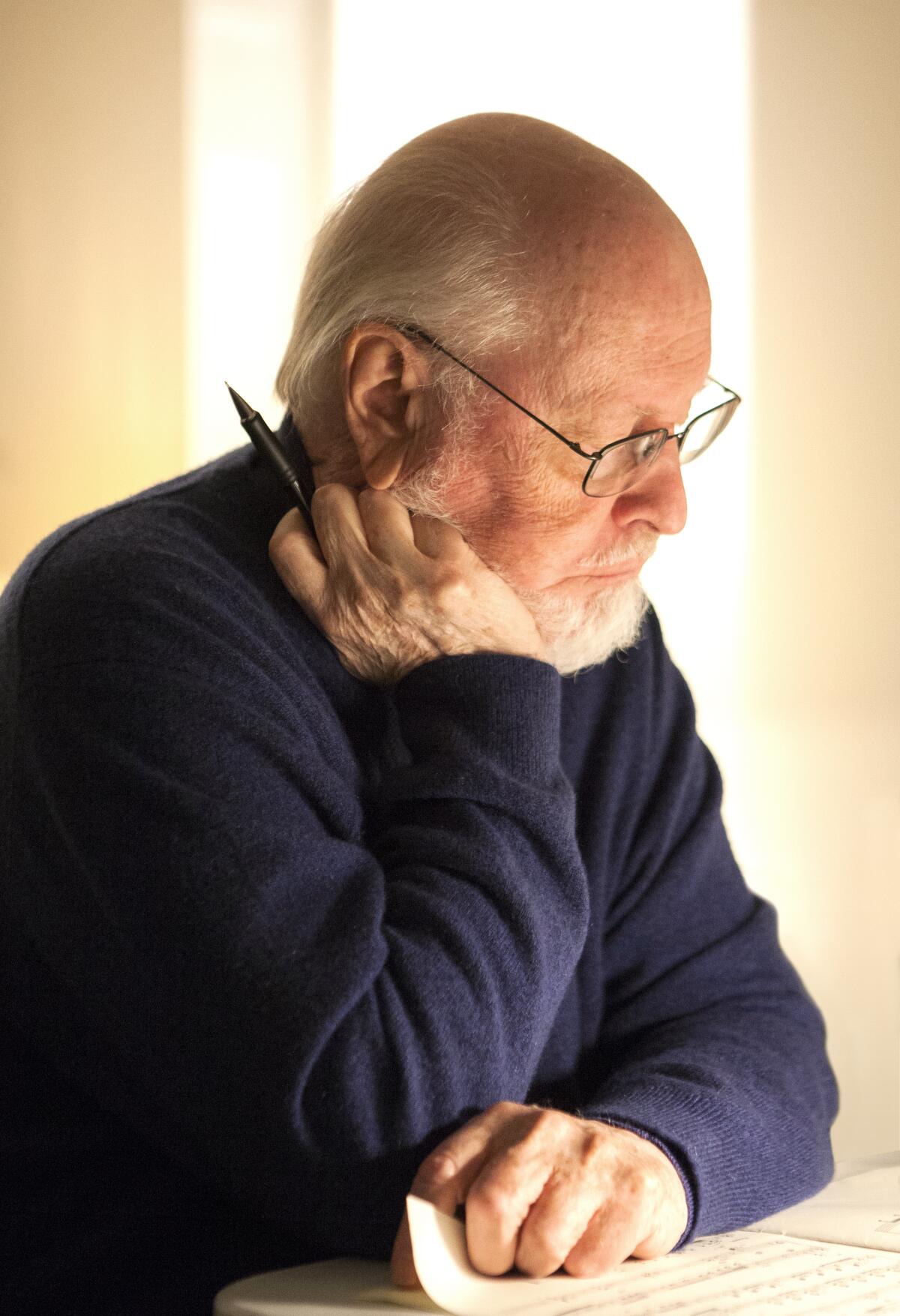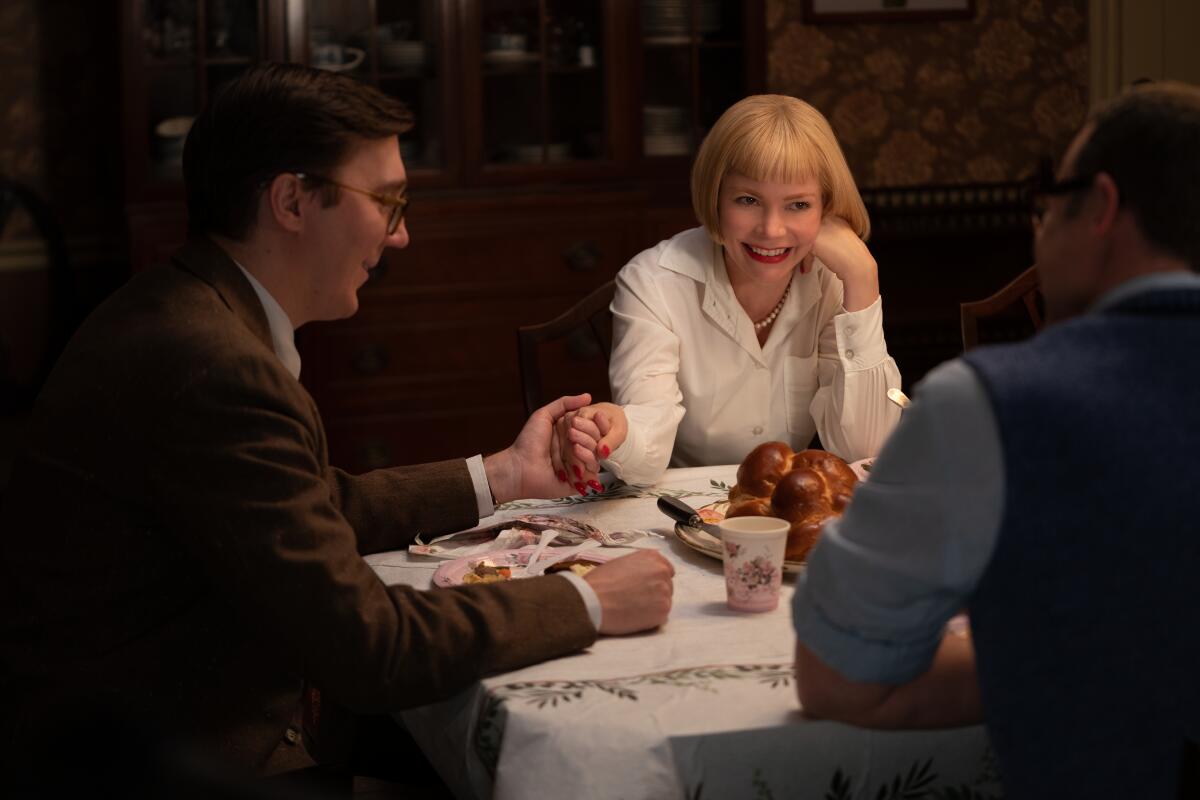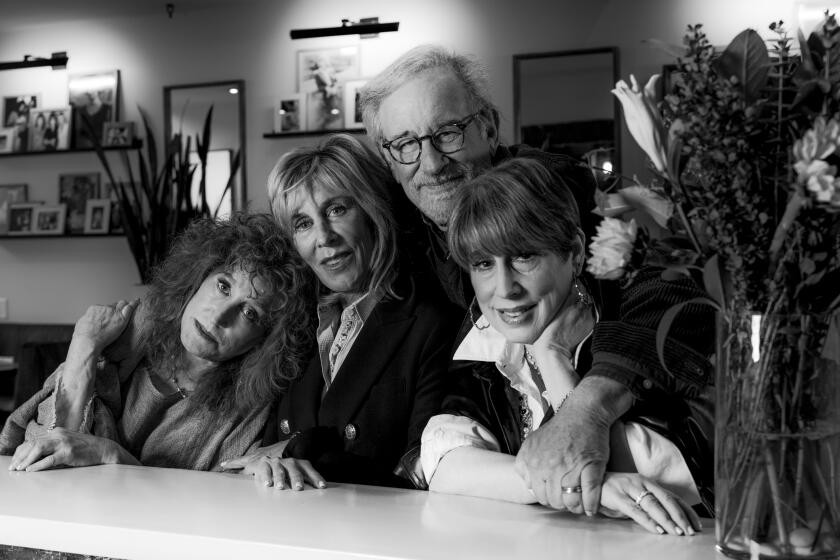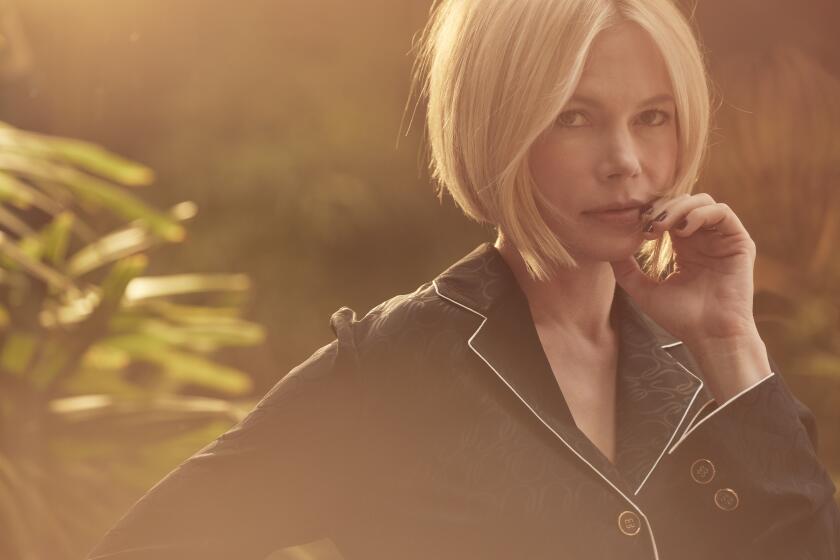John Williams and Steven Spielberg: Sometimes friends take it personally

- Share via
Unlike the exhilarating flights of fancy and historical epics that Steven Spielberg and composer John Williams have dreamed together — from “Close Encounters of the Third Kind” to “Lincoln” — “The Fabelmans” was an intimate journal about Spielberg’s own childhood. And Williams felt every emotion within its frames.
“I think it’s the most personal score John’s ever written for any of our collaborations,” Spielberg says.
Williams notes his work was made possible only because of how deeply vulnerable the director allowed himself to be with the film. “It was incredibly generous of him to want to share, particularly the pain in his adolescent years of the divorce,” says Williams, 91. “I found it amazing that he would want to reveal such personal aspects of his life so close to the bone and the soul.”
The score it inspired earned Williams his 53rd Oscar nomination — the most of any living person.
The director and his three sisters — Anne, Sue and Nancy — have always been close. “The Fabelmans,” his film based on their childhoods, deepened the bond.
Having known his collaborator for so long, it’s only natural that the composer got to know Spielberg’s late parents as well. Arnold Spielberg was a radio operator in a B-25 bomber during World War II, and when Williams served in the Air Force in the 1950s, “I did do one trip on a B-25,” he says. “It was the loudest airplane I have ever heard. It’s a two-engine plane, and the radio bubble is in the top, which is where I was stuck. When I thought of Arnold and his many flights in that thing, I thought of him in a very heroic way.”
Spielberg’s mother, Leah, gave up a career as a concert pianist to raise her children, and she would always come to Williams’ scoring sessions.
“My mom adored him,” says Spielberg, 76, “and he adored her.”
Williams wrote a nostalgic, lullaby-like piano theme for the film’s lightly fictionalized version of mother and son. When he auditioned it for Spielberg on piano, the director began to cry.
“He was very, very emotional,” says Williams. “He really loves his parents, deeply.”
That theme, for Spielberg, “means how much John loved my mom, and how much John loves me.”

The first time it’s heard is actually near the end of the film, during the final scene between Spielberg family stand-ins Mitzi Fabelman (Michelle Williams) and teenage Sammy (Gabriel LaBelle) in the family kitchen. In fact, there’s very little original score in the 2 ½-hour movie — an anomaly in a cinematic collaboration that has always been soaked in music.
“The film kind of tells you where it needs music or where it would benefit without music,” Spielberg says. “But where there is score, it’s extremely necessary.”
More dominant are the vintage film scores that Sammy uses to soundtrack his amateur films, and the classical piano pieces seen being performed by Mitzi — including sonatinas by Friedrich Kuhlau and Muzio Clementi, and especially a piano concerto by Bach that accompanies a virtuosic sequence where Sammy discovers his mother’s biggest secret while cutting a home movie.
“We both agreed that the score would be sort of piano-centric,” says Williams, “and that probably it wouldn’t have an orchestra — a big expressive delivery of music for a film like this that was so personal and introspective.”
Williams wrote a few other intimate cues: A hopeful haze of strings and delicate celeste and harp notes bookend the future filmmaker’s odyssey, and the Fabelmans’ heartbreaking divorce announcement is scored with a helplessly repeating question on piano and string chords welling like tears.
Another significant theme is the dreamlike, minor key waltz for celeste and strings that accompanies Mitzi’s balletic dance by a campfire, as her husband Burt (Paul Dano) and secret love Bennie (Seth Rogen) look on. Spielberg’s mother often hummed to herself when she danced, and he considered having no score — but decided it was “a great opportunity for John to imagine the kind of bittersweet music my mom would have liked to have accompanying her.”
The actor hasn’t worked since “The Fabelmans” wrapped production. She is sated and fulfilled. And the mother of young boys. Bring on the joy!
“The closer it got to a wafting dream, the better we seemed to be,” says Williams, who thought to reprise that theme later, when Burt sees a photograph of his ex-wife.
“I always like to say that John rewrites my films musically,” Spielberg says. “And a callback like that is absolutely necessary, and so powerful, when Burt is looking at the picture and he’s suddenly overcome.”
The film ends with Sammy exiting the office of his hero, director John Ford (David Lynch), and skipping toward his future. Williams tried scoring that moment with the Irish folk song “The Rakes of Mallow,” used in Ford’s film “The Quiet Man,” and then tried an extended quotation of his score from “Jaws.”
The latter felt too on-the-nose — Spielberg had already broken the fourth wall twice — so they ultimately went with just a hint of the shanty theme from “Jaws” and an Irish-sounding jig. “I thought what we did would be missed by most people,” says Williams.
Many of the great filmmaker-composer marriages — like Alfred Hitchcock and Bernard Herrmann — end in divorce. But Spielberg and Williams have created the most lasting and arguably most important in Hollywood history.
“Fifty years in Earth time is a long time,” says Williams, “but in the cosmic time it’s a wink. It’s less than a second, in a way, in how you measure these things. But if you’re not bored with what you’re doing, time doesn’t weigh heavily ever on you.”
More to Read
Sign up for The Envelope
Get exclusive awards season news, in-depth interviews and columnist Glenn Whipp’s must-read analysis straight to your inbox.
You may occasionally receive promotional content from the Los Angeles Times.












